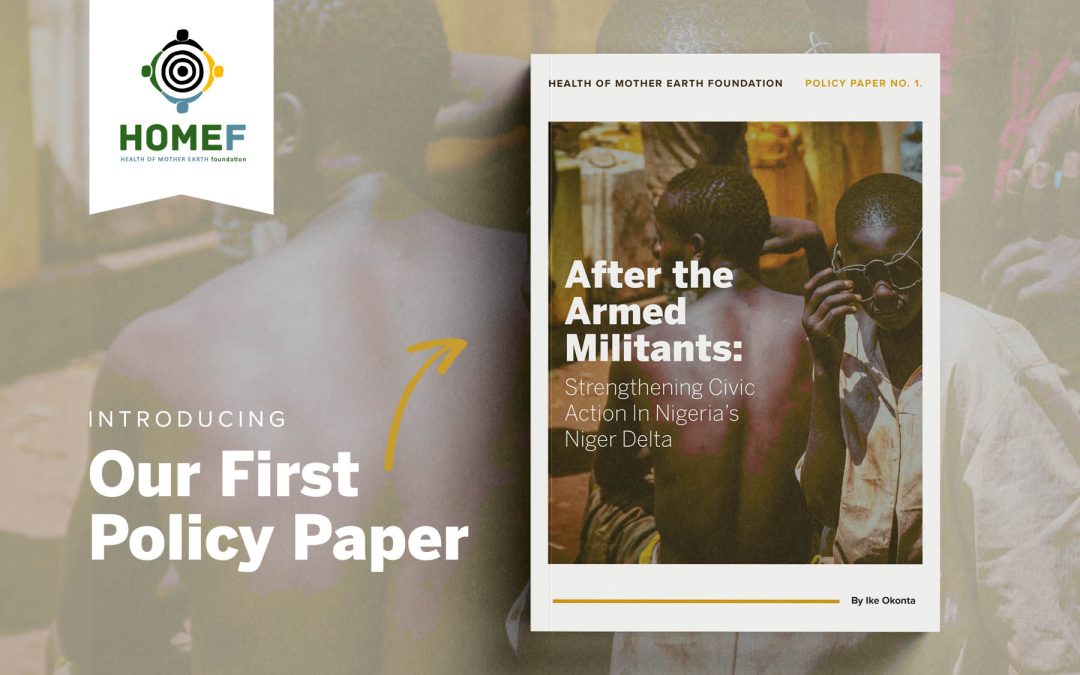This policy paper examines the long trajectory of the Niger Delta peoples’ struggle for social and environmental justice since crude oil was discovered in the region in 1956, and argues that nonviolent civic action is the most effective way for them to achieve their goals.
The paper analyses the long-running efforts by certain actors in the region to secure a just political settlement in the wider Nigerian federation by violent means, beginning with Isaac Adaka Boro’s short-lived armed rebellion in 1966, the attempted military coup against the General Ibrahim Babangida-led junta in 1990 by Niger Delta civilian and military elements, and the violent push by armed youth militants beginning in 2006 to resolve the matter and argues that these violent efforts worsened the plight of ordinary Niger Deltans instead of improving their condition.
The second section of the paper traces the genesis of non-violent protest in the region – writing protest letters to the government of the day, peaceful demonstration at oil production sites and participating in ‘minority’ politics at the state and federal levels. The Federal Government’s revenue allocation efforts also provided an opportunity for Niger Delta politicians and civic leaders to ventilate their grievances against a central government that had appropriated the bulk of oil revenues.
Mahatma Ghandi, Martin Luther King, and Ken Saro-Wiwa provided a model of non-violent civic action that Niger Delta leaders drew on as they engaged successive military governments in their effort to obtain economic and environmental redress. Saro-Wiwa made this explicit as he battled Royal Dutch Shell and its Nigerian subsidiary in the early 1990s. This is the subject of section three.
The fourth section focuses on the men of violence in the region – Isaac Adaka Boro, Great Ogboru and the 1990 coup leaders, and the young men of Odi who attempted to obtain justice through the barrel of the gun. The policy paper argues that the efforts of these armed actors did not bear worthwhile fruit and in fact worsened the situation of the ordinary people of the Niger Delta.
The emergence of the Movement for the Emancipation Of the Niger Delta (MEND) in 2006 was the culmination of efforts by these men of violence to forcefully alter the region’s grim condition. The consequence of this doomed effort has been further militarisation of the region by the Nigerian government’s Joint Task Force (JTF), escalating corruption as a fallout of the government’s sponsored Amnesty Programme, oil bunkering on an industrial scale, unregulated artisanal refining of crude oil and further strengthening of the multinational oil companies who now openly rely on the Nigerian military to ‘protect’ their installations. This is the focus of section five.
The paper concludes by arguing that the three main environmental nongovernmental organisations in the Niger Delta – Health Of Mother Earth Foundation, Environmental Rights Action, and Social Action – should ramp up their research, documentation and advocacy work using the tools of civic democracy and pooling together community-based organisations and smaller NGOs in a broad-based network of civic action. The paper highlights the work and life of the late Claude Ake, a Niger Delta indigene who through books and civic engagement as a public intellectual, provided a worthy example of civic-democratic action geared towards peaceful resolution of the Niger Delta crisis.
Download and Read the Policy Paper here





